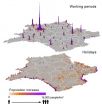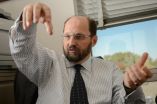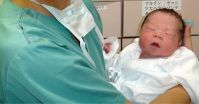European consensus on methodological recommendations for clinical studies in rare cancers
2014-10-28
(Press-News.org) One out of every five new cancer patients is diagnosed with a rare cancer, yet the clinical evidence needed to effectively treat these rare cancer patients is scarce. Indeed, conventional cancer clinical trial methodologies require large numbers of patients who are difficult to accrue in the situation of rare cancers. Consequently, building clinical evidence for the treatment of rare cancers is more difficult than it is for frequent cancers.
Dr. Jan Bogaerts, EORTC Methodology Vice Director, points out, "For rare cancers, we need alternative ways to conceive study designs and to analyze data. Also, the possibility to combine results would be particularly advantageous. Certainly, in the situation of rare cancers, collaborative networking is indispensable, and, of course, all of this needs to be funded properly."
In order to develop effective clinical trials for patients with rare cancers, international cooperation of experts with complementary skills and knowledge are required to find new ways to treat these diseases. In this light, the recommendations put forth by Rare Cancers Europe were the result of a consensus reached through multi-disciplinary and multi-stakeholder discussions. Rare Cancers Europe is dedicated to putting rare cancers firmly on the European policy agenda, and the EORTC is among the Cooperating Organizations.
These recommendations cover clinical decision-making in rare cancers, study designs in rare cancers, surrogate end-points in rare cancers, and critical organizational aspects of clinical research in rare cancers. In effect, they represent a road map showing the way to design trials to test new treatments in patients with rare cancers.
Rare Cancers Europe's recommendations on the methodology for clinical studies in rare cancers are available in Annals of Oncology.
INFORMATION:
ELSE PRESS RELEASES FROM THIS DATE:
2014-10-28
A study by the University of Southampton has found there are far fewer women studying economics than men, with women accounting for just 27 per cent of economics students, despite them making up 57 per cent of the undergraduate population in UK universities.
The findings suggest less than half as many girls (1.2 per cent) as boys (3.8 percent) apply to study economics at university, while only 10 per cent of females enrol at university with an A level in maths, compared to 19 per cent of males.
"This underrepresentation of women economics degrees could have major implications ...
2014-10-28
A solution to one of the key challenges in the development of quantum technologies has been proposed by University of Sussex physicists.
In a paper published today (28 October) in Nature Communications, Professor Barry Garraway and colleagues show how to make a new type of flexibly designed microscopic trap for atoms.
Quantum technology devices, such as high-precision sensors and specialised superfast computers, often depend on harnessing the delicate interaction of atoms. But the methods for trapping these tiny particles are hugely problematic because of the atoms' ...
2014-10-28
Researchers from North Carolina State University have developed a technique that co-opts an immune system already present in bacteria and archaea to turn off specific genes or sets of genes – creating a powerful tool for future research on genetics and related fields.
"This should not only expedite scientific discovery, but help us better engineer microbial organisms to further biotechnology and medicine," says Dr. Chase Beisel, an assistant professor of chemical and biomolecular engineering at NC State and senior author of a paper on the work. "For example, this ...
2014-10-28
A study by an international team, including the University of Southampton, has shown population maps based on anonymous mobile phone call record data can be as accurate as those based on censuses.
Their findings show maps made using mobile records are detailed, reliable and flexible enough to help inform infrastructure and emergency planners; particularly in low income countries, where recent population density information is often scarce.
Southampton geographer and senior author on the study, Dr Andy Tatem, says: "Proving the resilience and accuracy of using mobile ...
2014-10-28
In a new study, researchers from Uppsala University demonstrate that elderly men with self-reported sleep disturbances run a higher risk of developing Alzheimer's disease than men without self-reported sleep disturbances. The results are published in the scientific journal Alzheimer's & Dementia.
The researchers followed more than 1,000 men, who were initially 50 year old, between the years 1970 and 2010. The results of the study show that self-reported sleep disturbances were linked to an increased risk for Alzheimer's disease during the 40-year follow-up period, particularly ...
2014-10-28
This news release is available in German.
How do our close relatives, the chimpanzees, acquire sufficient food when times are lean? By studying wild chimpanzees in the Taï National Park in Côte d'Ivoire researchers of the Max Planck Institute for Evolutionary Anthropology in Leipzig, Germany, provide a clear example of how great apes can acquire extra energy needed to maintain large, costly brains. They show that chimpanzees make their sleeping nests more en route to breakfast sites containing fruits that are more competed for by other daytime fruit-eaters ...
2014-10-28
In 2003, a novel coronavirus caused a pandemic that affected 26 countries. Severe Acute Respiratory Syndrome (SARS) was most prevalent in Asia; the number of cases in Singapore was second only to China.
In an article published in the American Journal of Roentgenology (AJR), a group of radiologists in Singapore outline the ways in which both medical facilities and practitioners there have incorporated lessons learned from the SARS pandemic.
"The pandemic served as a wake-up call for the medical services, which had to respond and reorganize quickly to meet the rapidly ...
2014-10-28
EAST LANSING, Mich. --- Financial experts do not make higher returns on their own investments than untrained investors, according to research by a Michigan State University business scholar.
The first-of-its-kind study analyzed the private portfolios of mutual fund managers and found the managers were surprisingly unsuccessful at outperforming nonprofessional investors. The findings suggest average investors might be better served to handle their own portfolios rather than pay the often-high fees charged by mutual fund managers, said Andrei Simonov, associate professor ...
2014-10-28
Researchers at the University of Gothenburg have identified the biological clock that governs female fertility. The discovery represents a major contribution to research aimed at finding medical approaches to treating infertility in women.
Some women can have successful pregnancies at the age of 50, whereas other are unable to get pregnant when they are 30. Researchers are not yet able to fully explain such differences. One factor is that the onset of menopause is influenced by the point at which the uterus runs out of eggs to release.
A recent study at the University ...
2014-10-28
"Epithelial cell layers line all of the inner and outer body and organ surfaces in the human body, for example in the lung, intestine, pancreas and in the inner ear," said Moritz Gegg. Cilia – small, hair-like, microtubule-based structures – project from BBs and are precisely positioned on many of these epithelial cells. "Only through this exact positioning can cilia movements be coordinated so precisely that for example mucus can be transported from the lung or sound can be perceived from sensory inner ear hair cells," added Heiko Lickert.
Cilia are anchored ...
LAST 30 PRESS RELEASES:
[Press-News.org] European consensus on methodological recommendations for clinical studies in rare cancers



